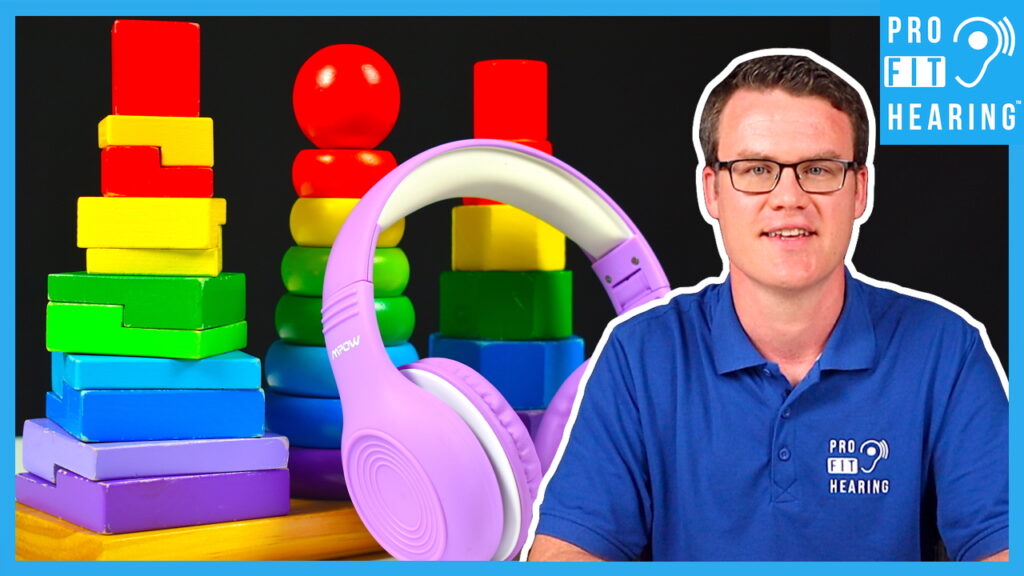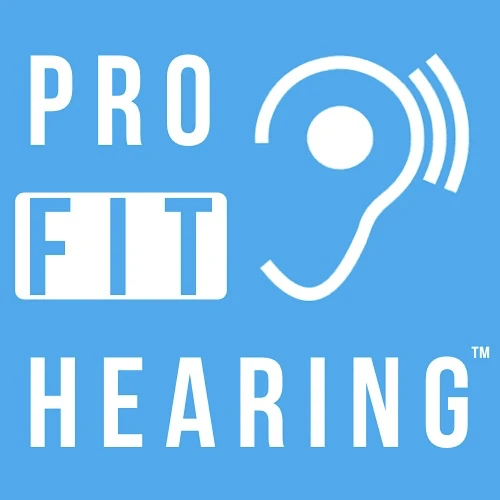Hearing Loss in Children – Hearing Loss Symptoms, Causes, and Types

Hearing Loss in Children – Hearing Loss Symptoms, Causes, and Types
For hearing loss in children, it’s critical to recognize hearing loss symptoms so that your child can get the care they need. In this post, I’ll also cover causes of hearing loss and hearing loss types. Coming up!
SUBSCRIBE to our YouTube channel for weekly videos!
Hi, I’m Dr. Derek – audiologist, audio engineer, and musician with ProFitHearing.com bringing you the best insight in today’s latest hearing aids, headphones, and audio technology to improve your life. If you have concerns about your hearing, always consult with your local physician or audiologist.
If you’re interested in hearing aids, check out my free eBook HERE.
Hearing Loss in Children
Today, I’m talking about hearing loss in children, causes and types. According to the Centers for Disease Control and Prevention (CDC), in a 2017 survey, 1.7 out of 1000 babies screened for hearing loss in the United States were identified with hearing loss (https://www.cdc.gov/ncbddd/hearingloss/data.html). Newborn hearing screening is completed before a baby leaves the hospital. If a baby fails the hearing screening, the testing is repeated and then further evaluation can be completed by a pediatric audiologist.
It’s important to identify whether a child has hearing loss as soon as possible so that your pediatrician can recommend an appropriate treatment plan. Impaired hearing can significantly impact speech and language development and overall communication. Your pediatric audiologist can make recommendations on whether to proceed with hearing aids or possibly consider cochlear implants. Note, however, that families of children who are born Deaf may choose to not treat hearing loss and instead pursue sign language for communication. Ultimately, it is the parent’s decision whether or not to treat hearing loss.
Hearing Loss Symptoms
So, what are some signs of possible hearing loss in babies?
The baby:
- responds to loud sounds but not others
- doesn’t startle to loud sounds
- doesn’t respond when their name is called
- doesn’t localize to sounds in their environment by 6 months
- doesn’t use single words like dada or mama by 1 year old
What are some signs of possible hearing loss in older children?
- the child has unclear speech
- the child listens to the TV at a loud volume
- the child has difficulty following directions
- the child has speech and language development delays
- the child has difficulty understanding speech in noisy situations
If your child demonstrates some of these possible hearing loss symptoms, please consult with your pediatrician for guidance. A pediatric audiologist can evaluate your child’s hearing.
Causes of Hearing Loss
So, what causes hearing loss? Hearing loss in children may be congenital or acquired. Congenital means they were born with it, and acquired means hearing loss onset occurred sometime after birth. Acquired hearing loss may occur before learning to speak (pre-lingual) or after learning to speak (post-lingual).
Congenital
Congenital hearing loss is genetic in 50-60% of cases and can be dominant, recessive, or x linked (meaning from genes found on the X chromosome). Genetic testing can determine whether hearing loss is the result of a genetic abnormality. Genetic hearing loss may be non syndromic (meaning no other symptoms) or syndromic (meaning presence of hearing loss with other symptoms).
Some examples of syndromes with hearing loss, or syndromic genetic hearing loss include:
- Down syndrome
- Usher syndrome
- Wardenburg syndrome
- Treacher Collins syndrome
- Alport Syndrome
- Pendred syndrome, among others.
An example of non syndromic genetic hearing loss is a Connexin 26 protein mutation on the GJB2 gene. Connexin 26 is important in the cochlea’s development and function. The cochlea is the part of the inner ear that contains the hearing sensory cells called hair cells. Any abnormality to the inner ear can cause hearing loss.
Congenital hearing loss may also be caused by various medical conditions which can include:
- prenatal infection, illness, or toxins from mom
- rubella, herpes simplex, cytomegalovirus
- anoxia – meaning baby doesn’t have enough oxygen
- maternal diabetes
- premature birth
- pre-eclampsia
Please consult with your doctor and complete all recommended check-ups during your pregnancy.
Acquired
Acquired hearing loss may be the result of the following
- Otitis media or ear infection
- noise exposure
- head injury
- ototoxic medication, meaning toxic to the inner ear
- chicken pox, meningitis, measles, mumps, influenza, encephalitis
- jaundice
Types of Hearing Loss
Ok, now that we’ve covered symptoms and causes of hearing loss, let’s discuss the different types of hearing loss. There are three types of peripheral hearing loss, meaning occurring within the ear. These types include: conductive, sensorineural, and mixed.
Conductive
Conductive hearing loss can occur in the external and/or middle ear. It just means that there is something abnormal with how sound travels into the ear canal and through the middle ear.
Some of the most common causes of conductive hearing loss include: earwax build-up (also known as cerumen build-up), fluid in the middle ear due to an ear infection, abnormal function of the ear bones (where they can not vibrate normally), or an eardrum perforation (or hole in the eardrum). There may also be congenital causes of conductive hearing loss such as microtia (an underdeveloped external ear) and atresia (a narrow ear canal or absence of ear canal).
Conductive hearing loss may be improved or reversed with a variety of medical or surgical options if determined to be appropriate by an Ear Nose and Throat physician (ENT doctor). Some possible treatments include: earwax removal, use of antibiotics, placement of PE/pressure equalization tube in the eardrum, use of a prosthetic ear bone, a patched eardrum, or reconstructive surgery.
Sensorineural
Sensorineural hearing loss occurs in the inner ear and is permanent. It is caused by damage to the hair cells inside the cochlea or by damage to the auditory nerve. Sensorineural hearing loss may be a result of genetic abnormalities, ototoxic medications, noise exposure, an auditory nerve tumor, illness or disease affecting the inner ear, or head trauma.
Mixed
Hearing loss can also be mixed. This is a combination of conductive and sensorineural hearing loss.
Central
In addition to the types of peripheral hearing loss discussed so far, hearing loss may also be central, meaning caused by a lesion in the central auditory pathway or cortex. The inner ear sends signals to our brain in response to sound, and the brain’s auditory processing center makes sense of all the sounds in our environment so that we can communicate effectively.
Resources
If you are looking for more information and resources on hearing loss in children, please refer to this link from the Centers for Disease Control and Prevention or CDC. A Parent’s Guide to Hearing Loss. https://www.cdc.gov/ncbddd/hearingloss/parentsguide/index.html
Let me know in the comments – what questions do you have about hearing loss in children? If you received value from this post, go to https://www.youtube.com/profithearing and check out all the videos on our YouTube channel.
-Dr. Derek
